#Maïmouna Doucouré
Explore tagged Tumblr posts
Text
Are you truly anti-harassment, @ anti-paradise?
Before we begin with this post, we would like to make the following clear:
asks, submissions and notifications have been turned off. We will not be looking at or answering any comments or reblogs, should there be any
we do not like being called proship, anti anti, anti or anti-shipper. We are critical of "both sides"
we are aware that most of the depicted accounts are owned by teenagers, with two or maybe three exceptions.
we are strictly against harassment and do not wish for the individuals here depicted or anyone else to be harassed
at the same time we are aware that there is at least one harasser who keeps interacting with the individuals described in this post, and who these individuals call "shoo". We condemn any harassers' actions
we collected screenshots from different posts, but we are not associated with any person
Now with that out of the way let's talk about the "infamous" anti proship group that has been making the rounds on tumblr. If you know who we are talking about, it is the individuals frequently found defending, following and or reblogging from the blog "anti-paradise" who was previously known as antiproshipconfessions.
We decided to categorize the group as "anti-fans". Unlike normal fans who interact with media or a person they are a fan of with genuine passion, anti-fans invest time and "passion" into mocking, criticizing, spreading bad faith rumors, and posting malicious posts or articles about the media, person or group they hate. This may also border sometimes on strong and negative obsession.
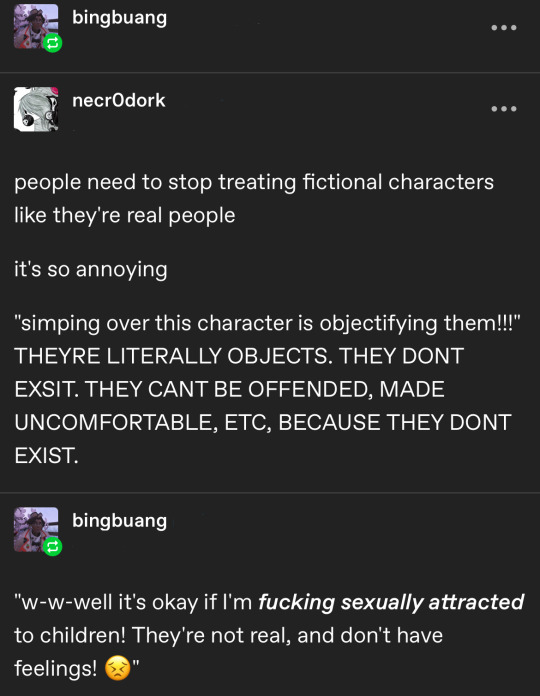
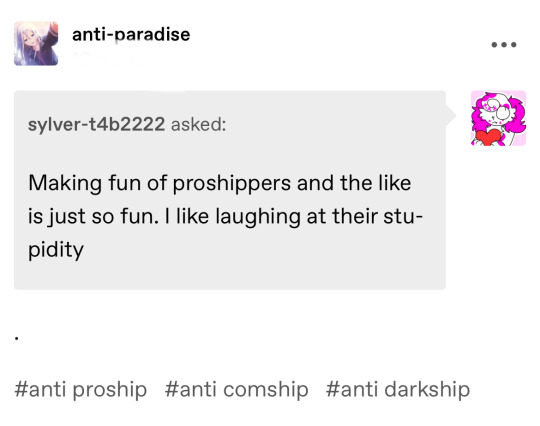
This specific group shows clear signs of this preciously mentioned anti-fan behavior.
We also need to mention that all of the people within their circle want fictional characters to be treated like human people, and anyone who tells them that fictional characters do not have human rights is quickly slandered as "insane".
They are invested in denying people of their humanity, their identity and are constantly breaking their own DNI as seen in the first screenshot above. They pretend that they are just "criticizing" people, but genuine criticism does not give anyone the right to make false accusations. If you want to criticize a work posted online, you begin with analyzing it, giving your thoughts and offering improvements.
Instead, these people made clear that their goal is to attack any small fish they perceive as "different" or "weird". They have not spoken up about bigger and controversial personalities whose works have wider reach such as Colleen Hoover, George R.R. Martin, Neil Gaiman, or Maïmouna Doucouré (Director of the movie "Cuties" - which was criticized for sexualizing the cast members, most of which were young girls)
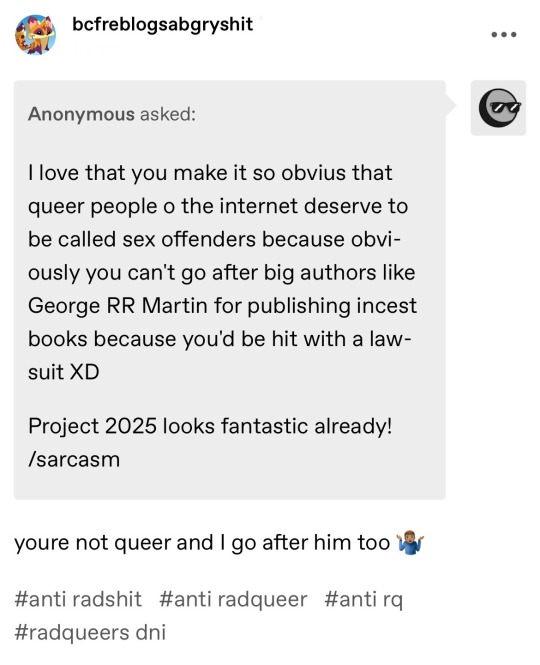
We have also looked through all of the accounts they have targeted in the past or present, and none showed any sign of worrying behavior towards or about (prepubescent) minors.
However, we are excluding people who identify as radqueer from this. We do not support them, but we believe that they should be left alone as well.
But why are these haters making these false accusations?
One of the major reasons is the concept of reciprocity: negative energy or behavior can be mirrored and reciprocated by those who encounter it.
Or simply said: haters attract hate. And haters rarely hate alone, they feel empowered when they hate the same thing together, and will encourage others into hating the same thing or people.

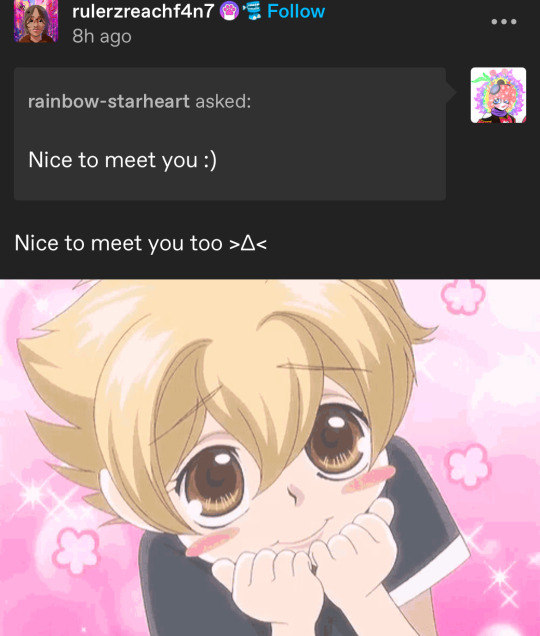

Hate groups form identities through symbols, rituals, myths and conspiracy theories, which enhance the members' status and, at the same time, degrade the object of their hate.
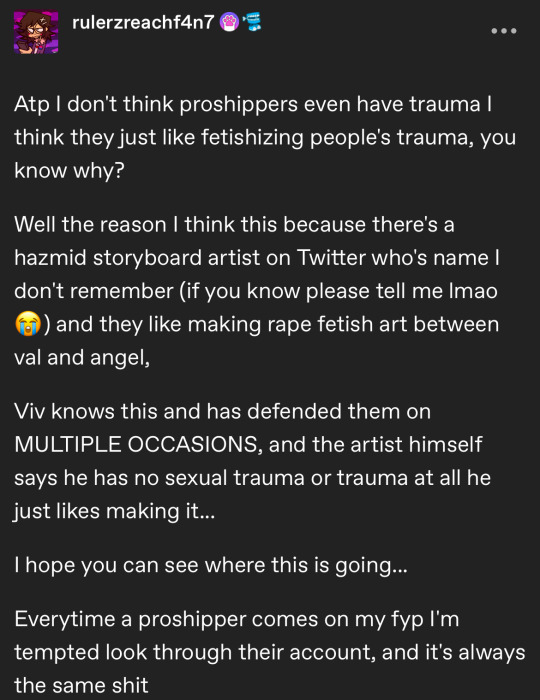
We would like to emphasize on the word "degradation". In the beginning of the post, we have described that these anti-fans deny their enemies their humanity and their identity.
This hate group has been noticed by both anti-shippers and pro-shippers because they have decided to use the loaded term "degenerate" and its variants against pro-shippers, and continue to defend the usage of this term.

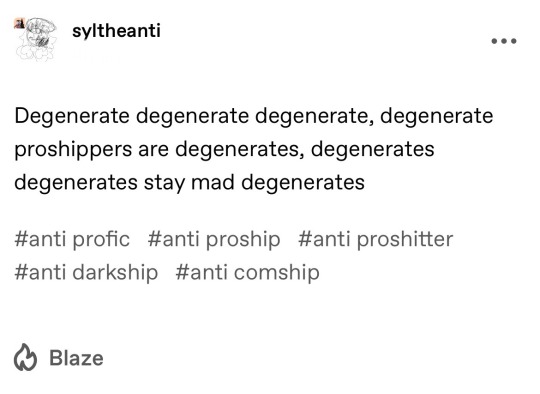
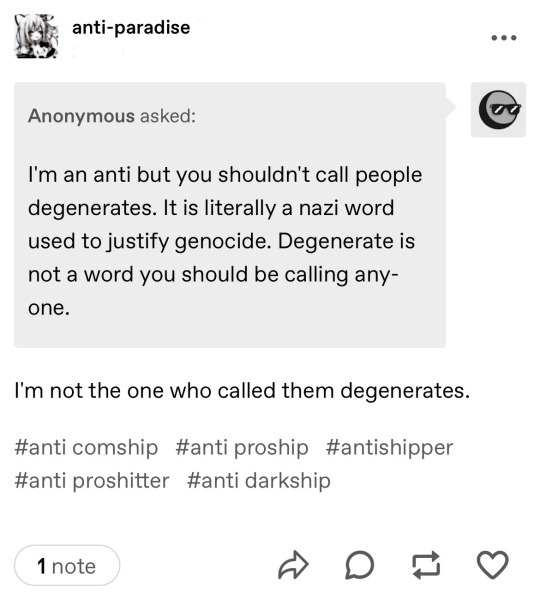
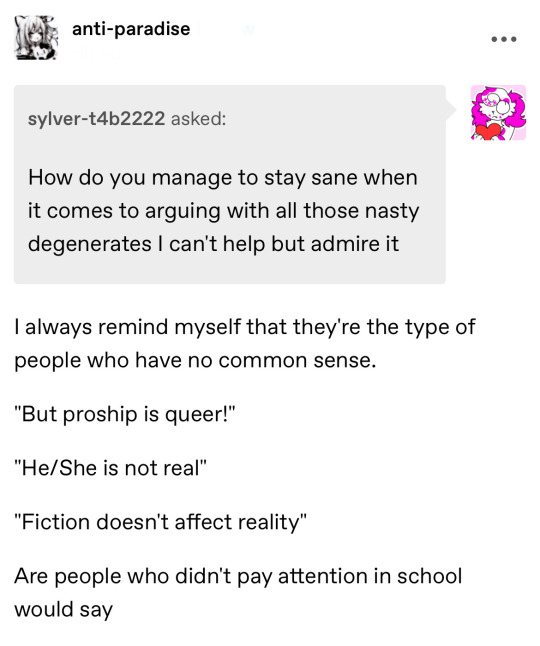
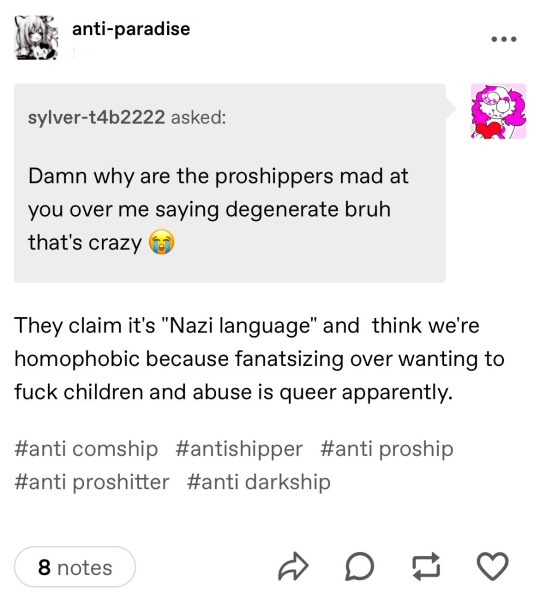
The screenshots above show that these people have been educated about the term and why they should not use it (by anti-shippers as well), but they ignored it in favor of continuing to defend and "giggle" about the controversy. It's just a "silly word" and using Nazi terms is no big deal apparently
And for those unaware, here is a small history lesson on why "degenerate" has explicit Nazi origins.
It was used centrally within their ideology since the 1920s to describe any group varying from their notion of the ideal human ("Aryan," straight, cis, etc). During the 1930s, the term was most known for the 1933 Nazi book burning (the destruction of literature considered as "Un-German") and the infamous 1937 Nazi exhibit "Degenerate Art."
Today, people like Nick Fuentes, Richard Spencer, and Donald Trump continue to use the term degenerate to attack minoritized people and political opponents.
Anyone who seriously uses the term "degenerate" is invoking Nazi ideology. When they call POC, Jews, queer/trans people, or anyone who may differ from them "degenerates," they're calling for our extermination. This is also something anti-paradise has not only "joked" about, the other hate group members supported it as well.
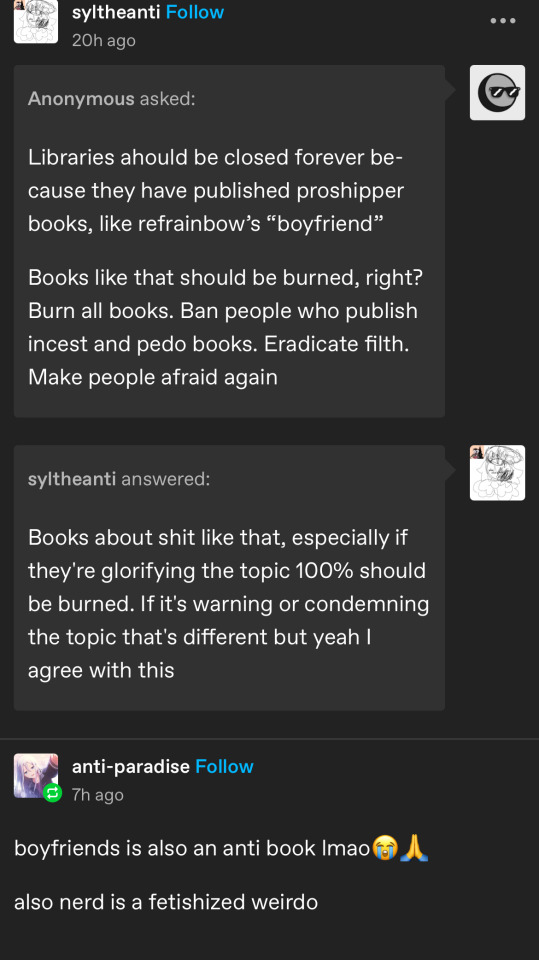

The extreme radicalization or just reactionary behavior, the need to defend open death threats, book burning, the erasure of their enemies' (proshippers) humanity, the eagerness to call them "illegal aliens" like racists call immigrants and refugees, the call to criminalize adult material, which will always affect and hurt minoritized people, the accusations that their enemies are "faking" their trauma, and denying that they are also LGBTQ+ or BIPOC/Jewish is extremely worrying.

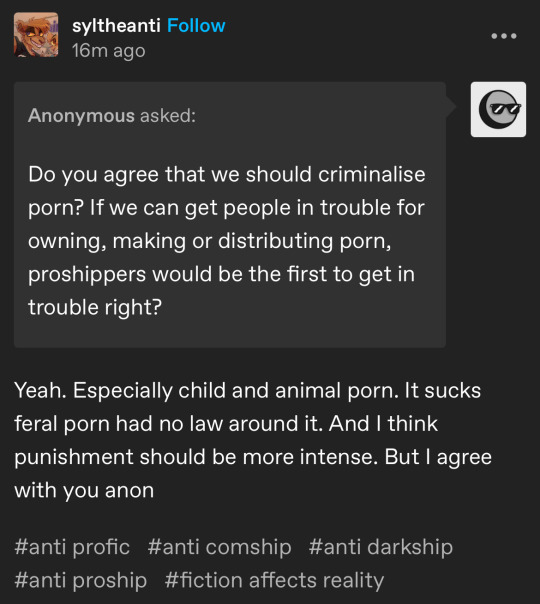
Some people have played their behavior down as "rage bait" coming from "uneducated" teenagers, but the eagerness they display when they degrade people they hate tells, in our humble opinion, a different story. We also believe that most anti-shippers at least respect pro-shippers' basic human rights and identities - these hateful people do not.
The accounts with the random usernames and standard tumblr profile picture is the previously mentioned harasser "shoo". Most of their accounts are deactivated
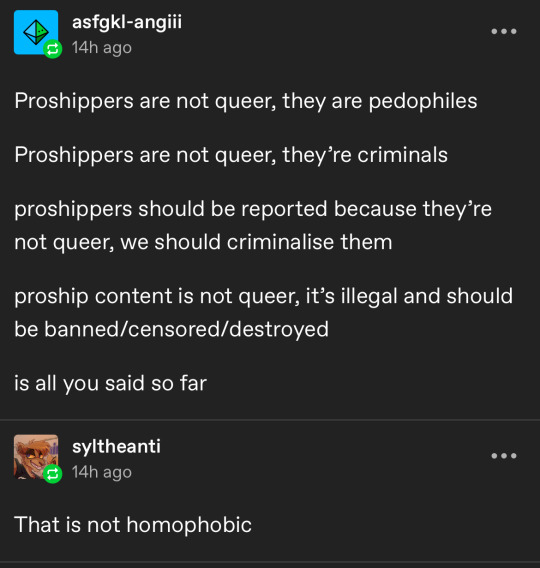
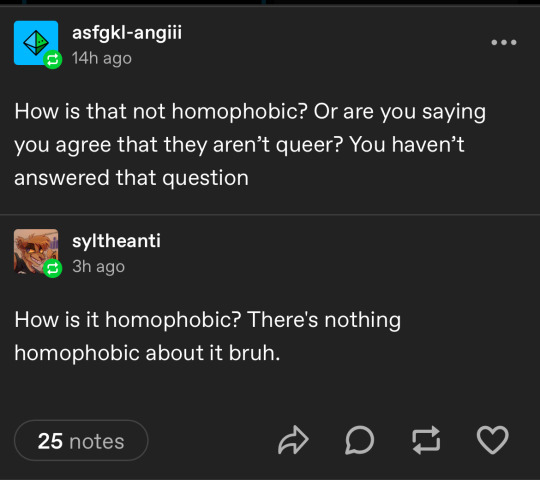
Curiously enough they want to "redeem" pro-shippers of their wrongdoings, but to do that you must actually see "wrongdoers" as human. People who merely exist in their own spaces and who do not intrude in yours are not evil. People who respect internet etiquette are not criminals, nor can someone "recover" from being in favor of letting people be, even if someone ships something they dislike.
You must respect a human person on grounds of being a human if you want to redeem them.
And to be human means that no one is good or bad, we are simply people.
Secondly, these people erroneously compare being in favor of letting people ship whatever they want as long as it's fictional to a coping mechanism. But being in favor of or against ships is not a coping mechanism, and they never suggest a coping mechanism that, in their eyes, is better than adhering to fandom and internet etiquette.

We also find it quite interesting that an adult, rainbow-starheart, has come to the defense of yet another hateful person (or teenager, we are not sure), who keeps using the term "degenerate", who agreed with the intent to criminalize adult material and who called for the destruction of a queer webtoon.
Naturally we do not see issue with people disliking "Boyfriends", but just because you may not like it doesn't mean you should wish for its or any art piece's destruction.
We also have reason to believe that the hate group members do not care about copying and or indirectly supporting Republicans and their plans to harm and censor LGBTQ+ people. They most likely know who they're sounding like - and chose not to care

The screenshot above depicts the Heritage Foundation's "Project 2025"

And this screenshot is Oklahoma's new planned bill to criminalize adult material. This bill doesn't directly name trans people, it makes a reference to gay and trans people instead ("warps young people's perception of the opposite sex").
Have you noticed that the Republican Senator is calling adult material "degenerate material" and likens it to a highly addictive drug? These people also believe that one can "recover" from a nonexistent porn or sex addition despite the fact that major health organizations recognize it as a behavioral problem rather than an addiction instead.


Our belief is that people like these, despite identifying with left leaning identities and movements such as LGBTQ+, have never truly unlearned internal biases or have picked up anti-kink rhetoric and sex negativity from conservatives.
This is made evident as they only target anything related to sex, sexual assault and sexual health or kink, and associate transgressive fiction and kink with pedophilia.
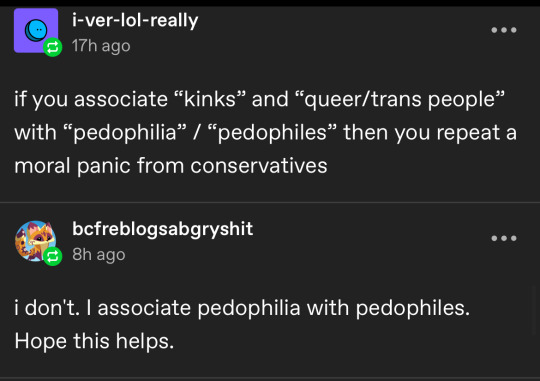
The screenshot of rulerzreachf4n7's complaint about Medrano's show "Hazbin Hotel" proves this as well, to them the only problem lies in the fetishization of sexual assault. Other problematic behavior such as Val's love-bombing, violence and the manipulation of Angel is ignored.
Lastly, we are concerned that this inappropriate and concerning behavior is encouraged by another adult. We do not know how connected they are to the hate group above as they have previously never interacted with each other before until the harassment started.
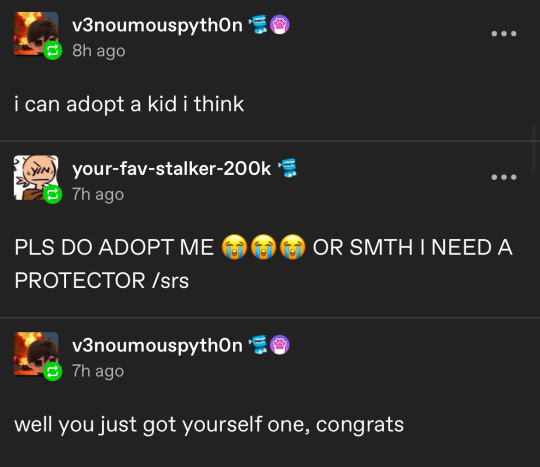
The conversation in this screenshot shows that this adult and rainbow-starheart have become "protectors" to (these) minors, and this inappropriate behavior has unfortunately been normalized in fandoms.
Do not misunderstand, we are not accusing either adult of grooming, we simply criticize inappropriate behavior some of them (may) have shown such as:
promoting anti science beliefs and encouraging youths to trust random bloggers more than medical professionals
seeking validation and emotional support from minors
posing as "one of the good ones"; a self proclaimed protector of children and the vulnerable.
showing minors 18+ material to "warn them" about certain artists
encouraging minors to openly discuss pedophilia and sexual abuse in art
casually discussing sexual topics openly or privately with minors.
reblogging public posts from or encouraging minors to publicly discuss the "ethics" of kink based on personal disgust
making themselves seem safe compared to artists who draw or write the "nasty" media they or the minors they encourage cause scenes over
bonding over how "gross" certain sexual topics are
encouraging minors to catfish people they believe to be pedophiles and or sexual predators to "expose" them or to gain evidence
encouraging minors to seek out and "criticize" adults (random strangers) about (their) kink(s)
A true "safe adult" who has the best intentions for a minor or minors would not encourage them to "make connections" to or discuss pedophilia so openly. Minors should not discuss or be encouraged to talk (to random strangers) about any of these things on a public platform, it is inappropriate and unsafe for them especially

Now we would like to finish this post with the following:
You are allowed to dislike or feel disgusted about anyone and anything, for any or no reason at all
remember that anyone can be a predator regardless of the ideology they have, the things they support or how they treat others
disgust is a defense mechanism that protects us from harm, but not everything that triggers feelings of disgust is harmful
if you are truly disgusted by someone or something, it is healthier and easier to avoid the person or the thing rather than mocking, attacking or verbally abusing the person or the thing
blocking people is not censorship, it is a tool to make your internet experience more pleasant
to any harasser/to anti-fans/to shoo: do not engage or stop engaging, move on and leave people alone
here is your chance to let this discourse finally die. Do not contribute more to it because it will affect you too
Fandoms are for many a place to escape life. Do not join fandoms if your intent is to be a hater
please do not encourage for the censorship of art in an age where this is happening again. It does not benefit you at all
remember that trauma is always dark and never clean, as such healing process of a survivor may be messy
education and information is power. Do your own research instead of blindly believing others or rumors
verdict: anti-paradise and followers are not anti harassment
#fandom#fandom discourse#anti fandom#anti-fan#antiship#proship#proship vs anti#tw death threats#tw pedophila mention#tw grooming mention#inappropriate behavior#proshippers#antishippers#far right#book burning#censorship#tw fetishization#tw harassment#tw mental health#fandom etiquette#internet etiquette#tw hazbin hotel#boyfriends webtoon#tw republican bills#anti-paradise#antiproshipconfessions
4 notes
·
View notes
Text
Film Journal
"Cuties" by Maïmouna Doucouré

0 notes
Text
Cinéma : Le Jury Un Certain Regard du 77e Festival de Cannes
L’acteur, réalisateur, scénariste et producteur canadien Xavier Dolan sera le Président du Jury Un Certain Regard du 77e Festival de Cannes. Il sera entouré de la scénariste et réalisatrice franco-sénégalaise Maïmouna Doucouré, de la réalisatrice, scénariste et productrice marocaine Asmae El Moudir, de l’actrice germano-luxembourgeoise Vicky Krieps, et du critique de cinéma, réalisateur et…

View On WordPress
0 notes
Text
0 notes
Text

Jenny Wakeman Facepalms Over Cuties
Original Template: https://www.deviantart.com/daydreaming-mad-dog/art/Jenny-Wakeman-is-Upset-Over-What-665840038
My Life as a Teenage Robot Belongs To Rob Renzetti, Rough Draft Studios, Inc. Frederator Studios, Frederator Networks, Inc. Wow Unlimited Media Inc. Nelvana Enterprises Inc. Corus Entertainment Inc. Nickelodeon Animation Studios, Nickelodeon Productions, Nickelodeon, Nicktoons, Nickelodeon Group, Paramount Global Content Distribution, Paramount International Networks, Paramount Domestic Media Networks, Paramount Media Networks, Inc. And Paramount Global
Cuties Belongs To Maïmouna Doucouré, Bien ou Bien Productions, France 3 Cinéma, France Télévisions S.A. Ciné+, CANAL+ S.A. Groupe CANAL+ S.A. Vivendi SE, BAC Films, And Netflix, Inc.
0 notes
Photo

Writer/director Maïmouna Doucouré announces development of a Josephine Baker biopic!
89 notes
·
View notes
Photo
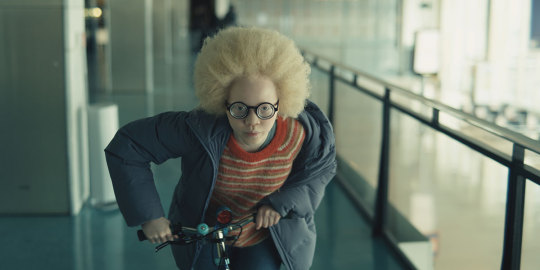
new-to-me #549 - Hawa
30 notes
·
View notes
Text
Cuties, and what it means to be seen
By the time you could watch it on Netflix, heated controversy had already brought notoriety to Cuties. A botched marketing poster and a viral clip had eclipsed the entire film. I watched it early, as the call to cancel Netflix subscriptions due to the film’s content was so loud that I felt there was a real chance that the platform would pull the movie (Netflix, to its credit, stood by the film and its director for the entirety of this fallout).

The claim: Netflix is promoting child pornography by showing pre-teen girls performing highly sexualized dance moves.
The counter: Cuties is a film that criticizes a culture that sexualizes children.
It’s true that the things that upset people about this film are the same things that necessitate its message, but Cuties is much more than political shock art. It is first and foremost a personal coming of age story from director Maïmouna Doucouré, who drew from her experience as a child of Senegalese immigrant parents growing up in France. Her story is at the heart of this movie, and it’s something to keep in mind when we watch Amy, the 11-year old protagonist of Cuties, as she tries to exist in the uncomfortable realm between girlhood and womanhood.
Like all girls this age, Amy is astute enough to perceive what’s going on with the adults around her. When she observes the purity culture in which her mother and aunt are attempting to raise her, she begins looking for other examples of what adulthood might look like. In an early scene, Amy longingly glances at her brother who is playing and horsing around while she is forced to attend women’s prayers. Later, she gives this same jealous glance to the popular girls practicing dance moves at her school.
Cuties explores a time in childhood where becoming an adult seems to be the most freeing possibility, but you’ve yet to understand the tools you need to accomplish it. Amy in particular is seeking tools to liberate herself from what feels like an oppressive fate as she watches her mother pretend not to be in pain at the thought of her husband bringing home a new wife. The tools that Amy finds are commonplace for most children: new peers, an after-school activity, social media, and all of the pitfalls that accompany it. The first time Amy posts a photo of herself online, it feels revelatory. Showing her face in this new way is a form of ownership and autonomy she has not experienced before, and as she receives a heart reaction, it’s like watching someone take the first hit of a drug. It’s a new form of currency.
This currency - being seen, being desired, being on exhibit for the approval of others - is the crux of Cuties and a large part of what upsets people about it. Amy and her new group of friends choreograph their dance based on hip hop music videos they have seen on their phones, and they perform with the brazen fearlessness of teen girls who have just discovered a superpower. Their confidence is intoxicating, and Amy latches onto it with the desperation of someone who fears she has no other options.
The girls, of course, do not understand this superpower, only that it is powerful. Cuties is very much about using sex appeal to feel grown up despite not understanding its consequences. Similar to how boys playact war (in games and in Hollywood), girls too will look at the world we have built for them and respond in kind. What does power look like for a woman? What do we tell girls when they ask us for help? Dancing is a form of joy or play. It is not inherently sexual, just like young girls and their bodies are not inherently sexual. It is the rest of the world that thrusts sexuality upon them before they know how to use it. If you give a young girl no resources to navigate the world, then of course they are going to make do with what they have. Amy’s actual power is her quiet observation, and it’s this skill - observing the world around her - that leads to her incorporating risque dance moves into her act.
Any time we are faced with shocking or upsetting content in art we should start by asking: “Was this made in good faith?” If the answer for Cuties is yes, then we owe it to the storyteller to give it the same chance we give to countless movies that show young men engaging in violence and war. An artist must be careful when using content that could potentially be harmful to people. Doucouré, like all auteurs, is very, very intentional in her filmmaking. It’s not a coincidence that the title - “cutie” - is a word that people use for a dog they want to cuddle, but also a word they use for a person they want to fuck.
The incongruence is jarring. Doucouré continually reminds us that these characters are just children. As they pound gummi candies into their mouths, as they shriek when they find a condom, as they accidentally humiliate themselves with language, objects, and actions they do not comprehend, their defiance is so confident. It is the opposite of what Amy has witnessed from the women in her own home, and Cuties is at its ugliest any time Amy’s newfound freedom is threatened. When the other girls try to exclude her or when someone tries to take her phone away, she lashes out. Horrified at her behavior, Amy’s mother asks at one point, “Who are you, Amy?” For the whole movie, Amy has been asking “What choices do I have?”

How do you become a woman? How do you navigate growing up into something that is loathed, feared, put on a pedestal, and objectified? The fact is that young girls do regularly have to tackle adult issues of womanhood long before they are ready, and when they do, they have no choice but to take their cues from the adults around them. Doucouré is showing us this reckoning through the lens of a young Muslim girl, and Cuties tells her story well.
What might it look like for a young girl to have power that isn’t pulled from a poisonous culture? The closing shot of the film shows Amy jumping rope, and the image is a bit too idyllic, giving no space for the realistic ramifications of what has just transpired in the movie. But it is a moment of relief in a movie that’s been very stressful, making Cuties less a lecture on sexualizing children than a story for young women to see themselves represented. Women who perhaps had to recognize their power only after first being harmed by the way the world sees them. This is not a film for people who think it’s OK to sexualize young women, but rather, a film for women who have suffered and who might feel validated by seeing this story told. People think the content is meant to shock you into being horrified at our culture. And sure, it is. But it is also meant for women who have encountered this story and who have been harmed by this narrative. It’s meant to recognize the stories they have lived through.
5 notes
·
View notes
Text
I’m thinking about Cuties and just getting more and more mad. I hate the new narrative that Netflix is the bad guy and the director Maïmouna Doucouré is the victim. You know who the real victims are? The extremely young child actresses who were way too young to understand the implications of being in this film.
I don’t care if the French movie poster looked innocent and the Netflix poster looked depraved. What matters the most is the ACTUAL MOVIE, and the actual movie that Doucouré directed exploited actual children.
And this is never, ever going to go away. Even if Netflix eventually takes the movie down. These child actresses were told by adults to twerk on camera and to mimic sexual acts, and that’s gonna be on the internet forever. The scene where one child exposes her bare breast will be saved and the clip will be circulated around the internet forever. The scene where a girl’s leather pants get pulled down and her panty-clad butt is shown will be saved and circulated around the internet forever.
Netflix is at fault. The director is at fault. These actresses’ guardians are at fault. Every adult who allowed this to happen is at fault. It literally doesn’t matter if the moral of the story is that sexualizing children is bad, because the creators of the movie sexualized and exploited children.
The damage isn’t just limited to the little girls in the movie, of course. They’re the main victims, but broadcasting the sexualization of children endangers children everywhere. I have no sympathy for Doucouré, for the people at Netflix and Sundance who agreed to show this film, or for any of the other adults responsible for this monstrosity.
269 notes
·
View notes
Text
The Cyclical Abuse of Black Children by Black Adults: “Cuties”
It's troubling that a good number of black adults from famed actress Tessa Thompson to up-and-coming YouTube video essayist Khadija Mbowe seem to mostly approve of the film Cuties. They're all like "the scenes of the children being sexualized were bad, BUT the message was great, so in a way that sexual exploitation was justified. Cuties is a powerful, provocative misunderstood film that resonates with me and reflects my childhood experiences!" It really epitomizes just how black adults, in this case primarily black women, will shove their trauma onto black children excepting them to deal with it and treat them like tools to vicariously replay their trauma through for catharsis. Then, they'll wonder why our kids are so pressured to grow up so quickly, abused like sex objects, and are never truly allowed to have childhoods.
The sexual exploitation of the children in Cuties killed the film and its message. It sought to denounce the sexualization of girls of color, particularly black girls, and just replicated that abuse. It was a failed, flawed venture and should be acknowledged as such. The director, Maïmouna Doucouré, failed in her message for the film likely for that kind of attitude that I described above. She and other people, including black adults praising this film, need to stop selfishly putting their trauma before children. A film's message and the feelings of adults should never outweigh children's safety.
I sincerely hope that the child actors in Cuties are alright and healing from all the pain that they had been put through by the public, their parents, and everyone involved in the making, production, distribution, and advertising of Cuties.
1 note
·
View note
Text
Cuties (2020)

The controversy surrounding Cuties (French: Mignonnes) is doubly-frustrating. Firstly, Netflix shouldn't have advertised it like it did. Secondly, because it threatens to turn audiences away from this nuanced and emotional coming-of-age story filled with excellent performances.
Eleven-year-old immigrant Amy (Fathia Youssouf) is often left on her own while her mother Mariam (Ma��mouna Gueye) deals with her two younger brothers and absent father. At school, she spots a group of disobedient girls called “The Cuties”. They dress like the women they see in music videos and are obsessed with an upcoming dance competition. In her quest to fit in with them, Amy grows increasingly distant from her family.
French writer/director Maïmouna Doucouré (in a spectacular debut) knows what she’s doing because she draws from real life. Amy’s new friends Angelica (Médina El Aidi-Azouni), Coumba (Esther Gohourou), Jess (Ilanah Cami-Goursolas), and Yasmine (Myriam Hamma) are only imitating what they see other women do. Is it their fault music videos so frequently zoom in on belly buttons, breasts, and arched backs? What did you expect them to do? Cuties deliberately makes you uncomfortable with long shots that show them practicing their moves as they prepare for the big show. It’s so creepy I kept thinking the police were going to barge in and arrest me. That’s the point.
And then suddenly the girls pause their obsession with adulthood. They giggle as they theorize how babies are made, have gummy bear-eating competitions, and demonstrate the importance of friendship by sharing their insecurities. You get a glimpse of what their childhood SHOULD be like. It’s not their fault they’re dressing and acting inappropriately. They don't know better, which makes you think long and hard about what responsibilities we have towards this next generation of women.
Like we’ve seen so often before, Amy’s misbehavior is caused by what’s happening at home. Her strict Muslim aunt whose little comments about what society expects of women, the lack of supervision, and more than anything else, her absent father’s actions. You so desperately want Amy to turn out OK but she keeps making all of these bad decisions and mistakes. Hopefully, she learns from them in time. If not, you don’t know what you’ll do.
The performances are so natural Cuties often feels more like a documentary than a drama. All the details are perfect. The jokes the girls tell, the way bullying is portrayed, the way they react to big issues, or ignore them completely because they’re too young to understand what’s happening. It’s addressing the issues we face here and now but this story is universal. It'll remain truthful even after we finally figure out at what age it’s appropriate to give kids smartphones and internet access.
Maïmouna Doucouré has made a film that's often uncomfortable and difficult to watch. Trust in it. Stick with it. In the end, the emotions converge, and Cuties leaves you enlightened and elated while still melancholic. This one will be hard to forget. (Original French version, September 9, 2020)

#Cuties#Mignonnes#movies#films#reviews#Moviereviews#FilmReviews#FilmCriticism#Maïmouna Doucouré#FathiaYoussouf#Médina El Aidi-Azouni#EstherGohourou#IlanahCami-Goursolas#Maïmouna Gueye#2020Movies#2020Films
63 notes
·
View notes
Text
Mignonnes is a good movie. Are there aspects of it that are meant to be deeply uncomfortable? Yes. Are there aspects of it that made me cringe? Absolutely. I think there could be a healthy debate regarding whether or not the dancing scenes end up becoming the very thing Doucouré criticizes, as it is a debut film and it’s not a perfect one by any means. That said, I think she tapped into the uncomfortable nuances of that stage of girlhood where girls imitate/replicate sexualized images they don’t fully understand because those images are packaged to them --- and therefore they view them as claiming a sense of freedom or agency or identity, and she does it without judging the characters or without the message being delivered in a sanctimonious tone and she does it in real time, we experience these things as Amy experiences them, there isn’t the comfort of retrospection so everything is uncomfortable because we know better whereas Amy and the others don’t.
51 notes
·
View notes
Photo

Cuties
directed by Maïmouna Doucouré, 2020
#Cuties#Mignonnes#Maïmouna Doucouré#movie mosaics#Fathia Youssouf#Médina El Aidi-Azouni#Esther Gohourou#Ilanah Cami-Goursolas#Maïmouna Gueye#Mbissine Therese Diop#Myriam Hamma
15 notes
·
View notes
Note
I think the problem people have with cuties is the camera angles
They are literal child actors and the camera shouldn’t be shoved in their buts like that
I am begging people to critically think about why filmmakers make the choices that they do, rather than just being critical of what is in front of you as if it exists in a vacuum. Cuties (2020) is a film about a group of very young teens who believe hypersexualisation is how they can get ahead and be perceived as beautiful FROM THEIR POINT OF VIEW. the scenes are filmed that way because the film is from their perspective and they feel empowered by what they’re doing because they’re kids imitating behaviour they don’t fully understand and if you had seen the film you would know this because this is made abundantly clear from the very first scenes. Also, if you’d bothered to do even a morsel of research, you’d have found that the director constantly made sure the girls were okay, explained to them exactly what they were doing and why, and had their parents (most of whom are activists fighting against the sexualisation of children) and a licensed psychologist with them on a closed set so they felt safe. Cuties (2020) is the most mismarketed film since Jennifer’s Body. The majority of the critiques being thrown at the film only show people have not actually seen it and instead just dog-piled on the popular incorrect discourse. Maïmouna Doucouré, a Black woman, made a very sincere ethical film exploring the way pre-teen girls of colour experience hypersexuality from the media, and its devastating her work has been overshadowed by people (a lot of whom are anti-Black too) who couldn’t be bothered to critically engage with her work. Don’t message me about Cuties unless you’ve actually seen it, and actually engaged with the director and her intent. The problem with Cuties (2020) is people didn’t watch it before condemning or critiquing it because they hate Black women. x
10 notes
·
View notes
Photo




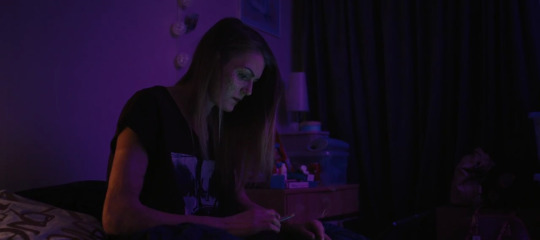
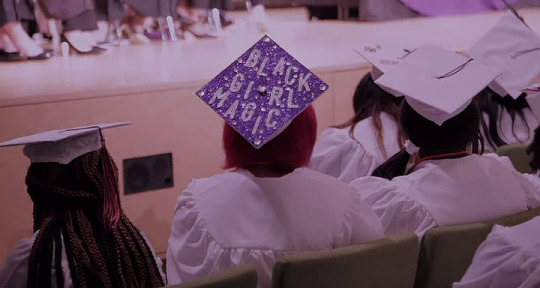
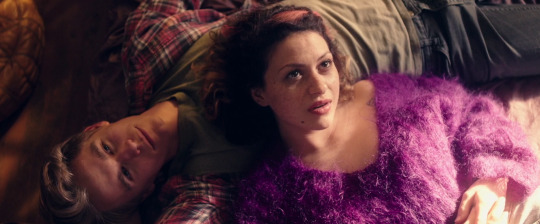
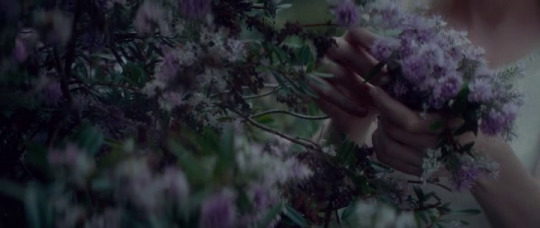
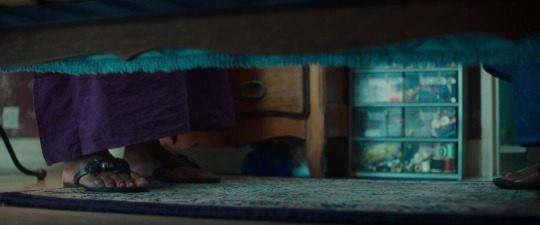
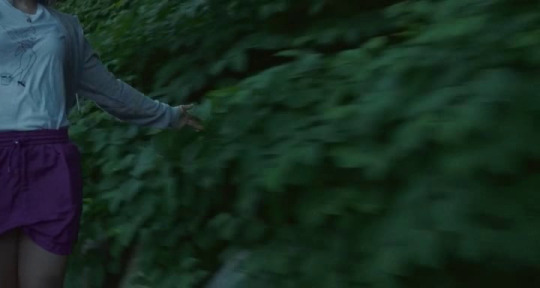
The colour purple is often associated with royalty, nobility, luxury, power, and ambition. Purple also represents meanings of wealth, extravagance, creativity, wisdom, dignity, grandeur, devotion, peace, pride, mystery, independence, and magic. Babyteeth dir. Shannon Murphy (2019) Jezebel dir. Numa Perrier (2019) The Glorias dir. Julie Taymor (2020) Little Forest dir. Yim Soon-rye (2018) Dirty God dir. Sacha Polak (2019) Step dir. Amanda Lipitz (2017) Paint it Black dir. Amber Tamblyn (2016) Woodshock dir. Kate Mulleavy & Laura Mulleavy (2017) Cuties dir. Maïmouna Doucouré (2020) Skate Kitchen dir. Crystal Moselle (2018)
#Babyteeth#Shannon Murphy#2019#Jezebel#The Glorias#Julie Taymor#Little Forest#2018#Yim Soon Rye#South Korea#Dirty God#Australia#USA#Step#Amanda Lipitz#2017#Paint it Black#Cuties#Maïmouna Doucouré#2020#France#Skate Kitchen#Crystal Moselle#purple#52 Films by women#polish#directed by women
108 notes
·
View notes









